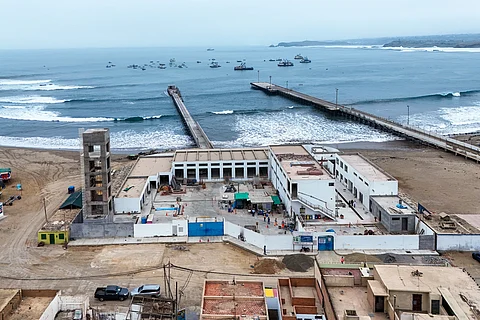

Peru's Government highlighted the growing investment in infrastructure for artisanal fishing, still ongoing, as one of the greatest achievements in the last year.
Photo: Produce.
In the last days of July, from the 28th to the 30th, Peru celebrates its National Holidays and, on this occasion, the President of the Republic, Dina Boluarte, addressed the nation, taking stock of the achievements of the last year. In her message, Boluarte highlighted the impact of the Ministry of Production (Produce) on economic growth, innovation, food security, and the modernization of fishing and aquaculture.
Regarding the latter two sectors in particular, the Peruvian President projected a sustained recovery for the current year. "We will achieve 5.4% GDP growth in the sector by the end of 2025, driven mainly by anchovy," she said.
In the same vein, the Minister of Production, Sergio González, also stated that in 2024, there were two important industrial anchovy fishing seasons, which generated approximately USD 700 million in exports, and emphasized that fishing generates foreign currency, economic growth, and around 400,000 jobs in the country.
"2025 has started with a first fishing season quite relevant. A healthy biomass was initially established based on scientific research carried out by Peru's Institute of the Sea, and in a sustained and responsible manner, a catch of approximately 2.5 million tons has been made," he added.
As WeAreAquaculture reported, anchovy catches for indirect human consumption - that is, anchovy for the production of fishmeal and fish oil - drove Peru's fisheries GDP growth in June, which, if we talk about extractive fisheries GDP alone, grew by 33.7%.
In her message to the country, Dina Boluarte also said that this progress is complemented by an increasing investment in infrastructure for artisanal fishing, works that will guarantee safer, healthier, and more efficient conditions for the development of all activities included in the sector value chain.
In this line, the President of Peru announced the modernization of four artisanal fishing landing sites (DPAs) in Lima and Ica, with an investment of more than PEN 170 million (USD 47.79 million), benefiting more than 13 thousand fishermen, traders, and their families. Meanwhile, the head of Produce announced that the San Juan de Marcona, Ica, Chancay, Supe, and Huacho landing sites will be completed and inaugurated this year.
Minister González insisted on the idea that the Peruvian Government is committed to modernizing the small-scale fishing infrastructure, providing fishermen with facilities that meet sanitary standards, with ice plants, cold storage areas, maneuvering yards, areas for preliminary tasks, etc.
To the works already completed or about to be completed will be added other emblematic works whose completion Boluarte announced for 2026, such as the DPAs of Paita, in the department of Piura, and Faro Matarani, in Arequipa, as well as an investment portfolio of more than PEN 300 million (USD 84.35 million), "ready to continue closing gaps and modernizing the country's fishing infrastructure."
Finally, the Peruvian President mentioned a key milestone for the future of the country's fishing sector: the construction of Peru's first scientific vessel in 47 years. This vessel will strengthen the monitoring of hydrobiological resources and guarantee sustainable fishing.
In addition, both Dina Boluarte and Sergio González pointed out that a total investment of PEN 813 million (USD 228.59) has already been approved for the renewal of the entire scientific fleet, with the construction of three research vessels in total, which, in turn, will serve to strengthen the Peruvian Institute of the Sea (Imarpe).
"The contract for the construction of the first scientific vessel has already been awarded. The agreement was signed with SIMA, a Korean company, and the amount amounts to more than PEN 220 million (USD 61.85 million). This will allow us to carry out scientific evaluations of our marine resources with international standards, strengthening the work of the Peruvian Institute of the Sea," Minister Gonzalez explained.
Imarpe's scientific advice is fundamental for Produce when making fisheries management decisions, seeking a balance between the sustainability of marine resources and the country's economy. In addition to carrying out its own exploratory expeditions, which can now be expanded with these new vessels, Imarpe is also in charge of directing other scientific operations, such as the one it is leading this week, which, for the first time in Peru, involves the artisanal fishing fleet in data collection.
